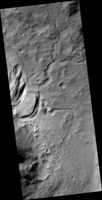
Map Projected Browse Image
Click on the image for larger versionThis image from NASA's Mars Reconnaissance Orbiter is a close-up of a trough, along with channels draining into the depression. Some HiRISE images show strange-looking formations. Sometimes it helps to look at Context Camera images to understand the circumstances of a scene -- like this cutout from CTX 033783_1509 -- which here shows an impact crater with a central peak, and a collapse depression with concentric troughs just north of that peak.
On the floor of the trough is some grooved material that we typically see in middle latitude regions where there has been glacial flow. These depressions with concentric troughs exist elsewhere on Mars, and their origins remain a matter of debate.
NB: The Context Camera is another instrument onboard MRO, and it has a larger viewing angle than HiRISE, but less resolution capability than our camera.
The map is projected here at a scale of 50 centimeters (19.7 inches) per pixel. [The original image scale is 51.3 centimeters (20.2 inches) per pixel (with 2 x 2 binning); objects on the order of 154 centimeters (60.6 inches) across are resolved.] North is up.
The University of Arizona, Tucson, operates HiRISE, which was built by Ball Aerospace & Technologies Corp., Boulder, Colorado. NASA's Jet Propulsion Laboratory, a division of Caltech in Pasadena, California, manages the Mars Reconnaissance Orbiter Project for NASA's Science Mission Directorate, Washington.

